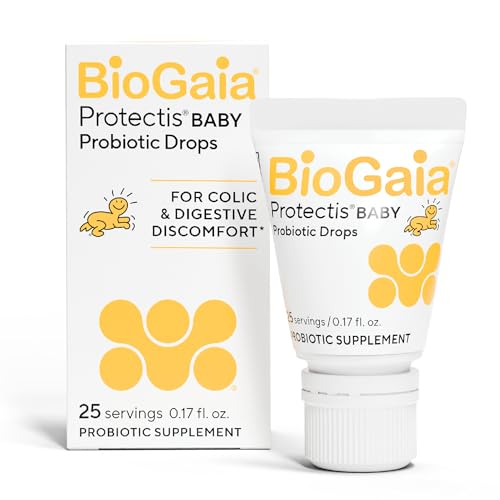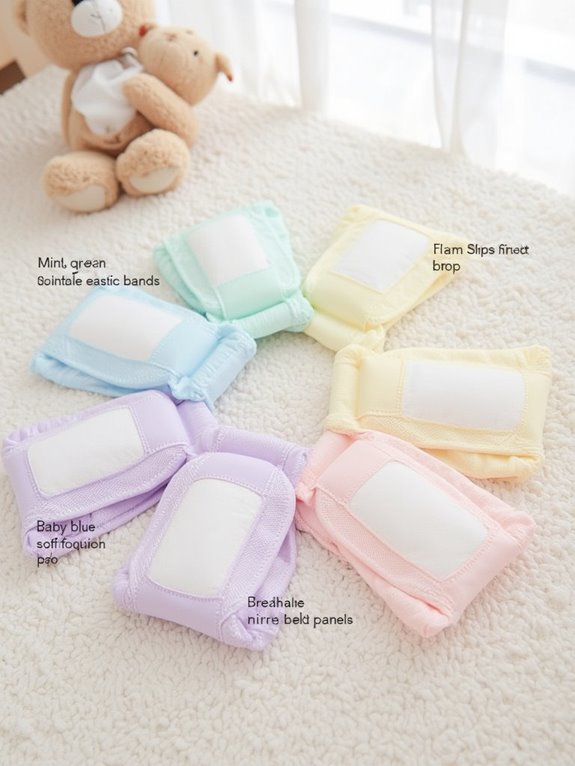As an Amazon Associate, we earn from qualifying purchases. Some links may be affiliate links at no extra cost to you. Although our opinions are based on curated research, we haven't used these products. Articles generated with AI.

5 Best Ways to Soothe Your Colicky Baby, According to Pediatricians
Pediatricians recommend five proven methods to soothe your colicky baby: probiotic supplements containing Lactobacillus rhamnosus GG, which can show results within 24 hours; natural probiotic drops like BioGaia Protectis that include vitamin D; heated belly bands such as Dr. Browns Gripebelt for targeted warmth; comforting plush toys with heat/cold therapy options; and specialized tummy wraps for gentle compression. Proper supervision and temperature monitoring are essential for safety. These methods represent just the foundation of all-encompassing colic relief solutions.
Key Takeaways
- Use clinically proven probiotic strains like Lactobacillus rhamnosus GG and Bifidobacterium animalis BB-12 to improve digestive comfort.
- Apply gentle heat therapy through supervised use of warm belly bands or microwaveable packs for targeted tummy relief.
- Administer BioGaia Protectis Baby Probiotic Drops, which contain natural probiotics found in breast milk and vitamin D.
- Combine comfort measures with engaging plush toys like Hedgehog or Panda to distract and soothe the baby.
- Monitor treatment effectiveness daily and consult pediatricians if colic persists beyond 3-4 weeks of consistent intervention.
Culturelle Baby Digestive Calm & Comfort Probiotic for Infants (0-12 Months)
Culturelle Baby Digestive Calm & Comfort Probiotic (Age 0-12 Mos) 8.5Ml, Helps Periodic Colic, Gas,...
- FROM THE #1 PEDIATRICIAN RECOMMENDED PROBIOTIC BRAND⟐: Build a strong foundation for infants with Culturelle Baby Digestive Calm + Comfort Drops.* Formulated with two...
- GENTLE INGREDIENTS: Contains Lactobacillus rhamnosus GG and other probiotics proven to help with occasional tummy troubles and help ease occasional infant colic.* Works...
- SAFE and EASY TO TAKE: Shake before use; dispense 5 drops once a day onto a spoon, into a bottle or directly into baby’s mouth while breastfeeding; replace cap with...
When your baby suffers from colic and digestive discomfort, Culturelle Baby Digestive Calm & Comfort Probiotic offers a science-backed solution for infants aged 0-12 months.
This clinically tested formula contains two key probiotics: Lactobacillus rhamnosus GG and Bifidobacterium animalis BB-12. These beneficial bacteria help restore your baby’s gut balance and reduce fussiness, gas, and crying – sometimes within 24 hours. Simply give five drops daily by adding them to a bottle, spoon, or during breastfeeding.
The product is vegan, gluten-free, and non-GMO. While results vary among infants, pediatricians widely recommend this probiotic. Always consult your baby’s doctor before starting any supplement regimen.
Best For: Parents seeking a safe, clinically-proven probiotic solution for infants (0-12 months) experiencing colic, digestive issues, gas, or general fussiness.
Pros:
- Contains well-researched probiotic strains (LGG and BB-12) with proven effectiveness for infant digestive health
- Quick results reported by many parents, sometimes within 24 hours of use
- Versatile administration methods (can be given via bottle, spoon, or during breastfeeding)
Cons:
- Liquid consistency makes precise dosing challenging with the dropper
- Must be used within 60 days of opening, which may lead to product waste
- Results can vary significantly between infants, with some experiencing no improvement
BioGaia Protectis Baby Probiotic Drops for Colic & Gas Relief
BioGaia Protectis Baby Probiotic Drops | Baby Essentials for Colic & Gas Relief | Safe for Newborns...
- SOOTHES CRYING, FUSSING, COLIC & GAS: For over 20 years, BioGaia Baby has been soothing babies with colic & fussy tummies.* Trust BioGaia Baby, the most studied probiotic...
- SAFE FOR NEWBORNS: Simple & safe for babies from the first day of life. Great for breast-fed, bottle-fed, and mixed-fed infants.
- NATURALLY RELIEVES BABIES' DIGESTIVE DISCOMFORT: Works naturally in the digestive system to relieve colic, gas, spit-ups, and occasional constipation & diarrhea*
Parents seeking a scientifically-proven solution for their colicky baby will find BioGaia Protectis Baby Probiotic Drops to be a well-researched option. These drops contain beneficial bacteria naturally found in breast milk and are safe from day one for all feeding types.
Key benefits include:
- Relief from colic, gas, and fussiness
- Improved sleep duration
- Better stool consistency
- No allergens, dairy, soy, or artificial ingredients
For best results, consistently administer the drops daily and mix them with milk or formula. While some parents note the price and serving size concerns, many report significant improvements in their baby’s digestive comfort within three days of use.
Best For: Parents seeking a research-backed, natural solution for infant colic, gas, and digestive discomfort, particularly those who prefer a probiotic alternative to traditional medications.
Pros:
- Scientifically validated formula with probiotics naturally found in breast milk
- Safe from birth and compatible with all feeding types (breast, bottle, or mixed)
- Shows noticeable improvements in baby’s comfort and sleep within days of use
Cons:
- Higher price point compared to traditional colic remedies
- Bottle may contain fewer servings than advertised
- Drops can leave an oily residue in bottles that requires thorough cleaning
BioGaia Protectis Baby Probiotic Drops (50 Day Supply)
BioGaia Protectis Baby Probiotic Drops | Colic & Gas Relief + Vitamin D | Safe for Newborns | Ease...
- SOOTHES CRYING, FUSSING, COLIC & GAS: For over 20 years, BioGaia Baby has been soothing babies with colic & fussy tummies.* Trust BioGaia Baby, the most studied probiotic...
- SAFE FOR NEWBORNS: Simple & safe for babies from the first day of life. Great for breast-fed, bottle-fed, and mixed-fed infants.
- NATURALLY RELIEVES BABIES' DIGESTIVE DISCOMFORT: Works naturally in the digestive system to relieve colic, gas, spit-ups, and occasional constipation & diarrhea.*
Trusted worldwide for over two decades, BioGaia Protectis Baby Probiotic Drops offer a scientifically-validated solution for colicky infants. This 50-day supply contains probiotics naturally found in breast milk and includes essential vitamin D for bone health and immune function.
Key features:
- Safe from day one for all feeding types
- Free from common allergens (dairy, soy, gluten)
- Easy-to-use dropper for precise 5-drop dosing
- Can be given directly or mixed with milk/water
You’ll find these drops particularly effective after antibiotics or during colic episodes. While some parents note the premium price point, clinical studies and pediatrician recommendations support its effectiveness in reducing crying, gas, and digestive discomfort.
Best For: Parents seeking a clinically-proven probiotic solution for infants experiencing colic, digestive discomfort, or needing vitamin D supplementation, especially suitable from birth onwards.
Pros:
- Scientifically validated with over 20 years of clinical studies showing effectiveness in reducing colic and digestive issues
- Contains naturally-occurring probiotics found in breast milk plus vitamin D for added immune support
- Free from common allergens and suitable for all feeding types (breast, bottle, or mixed)
Cons:
- Premium price point compared to other probiotic options
- Small bottle size requiring frequent repurchase (50-day supply)
- Some babies may not respond to treatment or may dislike the taste
Dr. Browns Infant Gripebelt Heated Belly Band for Babies
Dr. Brown's Infant Gripebelt Heated Belly Band, Soothe Baby's Tummy with Gentle Warmth and...
- WARMING COMPRESSION BELLY WRAP. The doctor-designed adjustable heated tummy wrap provides warmth and gentle compression to help soothe upset stomach.
- SAFE TO USE. The Gripebelt provides effective comfort without baby ingesting medicine or medications.
- QUICK AND CONVENIENT. The Gripebelt comes with a microwaveable hot pack and is easy to assemble. Simply warm the included clay pack in the microwave for 10 seconds,...
The Dr. Browns Infant Gripebelt features a microwaveable clay pack that delivers gentle warmth to soothe your baby’s upset stomach. You’ll find it helpful for managing colic, gas, and general tummy discomfort without medication. The belt comes with a plush toy design (Hedgehog, Panda, or Lamb) and adjustable straps for a secure fit.
Important safety notes:
- Heat clay pack for only 10 seconds
- Monitor temperature before applying
- Never leave on during sleep
- Remove immediately if baby shows distress
- Machine wash on delicate cycle
The belt’s effectiveness varies between babies, but many parents report improved sleep and reduced crying after use. Remember to always supervise your baby while using this product.
Best For: Parents seeking a drug-free solution for babies (0+ months) experiencing colic, gas, or general tummy discomfort who want a reusable, adjustable warming solution.
Pros:
- Includes cute plush toy design (Hedgehog, Panda, or Lamb) that engages baby while providing comfort
- Versatile clay pack can be heated or frozen for both warm and cold therapy
- Machine washable and durably constructed for repeated use
Cons:
- Requires careful monitoring of temperature to prevent overheating or burns
- Cannot be used during sleep, limiting its effectiveness for nighttime relief
- Effectiveness varies between babies, with some showing minimal improvement
Baby Colic and Gas Relief Heated Tummy Wrap
ISANPAN Baby Colic and Gas Relief - Cassia Seed Heated Tummy Wrap,Infant Warming Pad Belly Band...
- 1 Hot compresses can effectively relieve infant colic, flatulence, irritable bowel syndrome and constipation and is a scientifically proven physical therapy. Providing...
- 2 Gripe belt for babies is in animal shape, cute cassia heating bag hope it can divert your baby's attention from colic and flatulence, help to relieve your baby's colic...
- 3 Adjustable heated tummy wrap provides warmth and a gentle compress to help relieve pain associated with colic, reflux and gas.ISANPAN baby heating pads for belly is...
Providing gentle warmth and compression, a heated tummy wrap offers targeted relief for infants struggling with colic, gas, and digestive discomfort. The wrap includes a microwaveable cassia seed pack shaped like an animal to distract your baby while delivering soothing heat therapy.
Important Safety Notes:
- Always test temperature before applying to your baby’s skin
- Follow heating instructions precisely to prevent burns
- Never leave the wrap unattended on your infant
- Inspect the wrap before each use for damage
While many parents report success with this method, proper supervision is essential. The adjustable design ensures a secure fit, but you’ll need to monitor your baby throughout use and remove the wrap if any signs of discomfort occur.
Best For: Parents seeking a natural, non-medicinal solution for babies (0-12 months) experiencing colic, gas pains, or digestive discomfort.
Pros:
- Provides gentle, soothing warmth therapy that helps relieve colic and gas symptoms
- Adjustable design with secure fastening ensures proper fit for different-sized babies
- Features engaging animal design that helps distract baby during treatment
Cons:
- Requires careful monitoring of temperature to prevent potential burns
- Some quality issues reported with zippers and durability
- Must be closely supervised during use, making it less convenient for nighttime relief
Factors to Consider When Choosing Colic Baby

When selecting treatments for your colicky baby, you’ll want to carefully evaluate key factors that impact both effectiveness and safety. The most critical considerations include checking ingredient quality and safety certifications, confirming age-appropriate formulations, and understanding how the treatment method aligns with your baby’s specific needs and your family’s routines. You’ll also need to weigh treatment duration expectations against cost-effectiveness, ensuring you’re making an informed choice that provides reliable relief without straining your budget.
Safety and Ingredient Quality
Safety considerations and ingredient quality stand at the forefront of choosing any products for your colicky baby. You’ll need to carefully examine product labels to ensure they’re free from common allergens like dairy and soy, which can trigger adverse reactions in sensitive infants.
When selecting probiotics or supplements, look for:
- Clinically proven strains like Lactobacillus rhamnosus GG
- Non-GMO certification
- Gluten-free formulation
- No artificial colors or preservatives
- Ethically sourced ingredients
Before introducing any new product, it’s crucial to consult your pediatrician to verify its appropriateness for your baby’s age and condition. They can help evaluate the ingredients and confirm that the supplement aligns with your infant’s specific needs. Remember to choose products manufactured under strict safety standards to protect your baby’s delicate digestive system.
Age Range Compatibility
Understanding the right age compatibility stands as a critical factor in choosing colic relief methods for your baby. Before selecting any treatment or product, you’ll need to verify that it’s specifically designed for your infant’s developmental stage.
Key age-related considerations:
- Check product labels for clear age recommendations
- Match probiotic formulations to your baby’s specific age group
- Ensure physical therapy methods are appropriate for your infant’s development
- Verify safety guidelines for items like belly wraps or massage tools
Don’t assume that what works for older babies will be safe for newborns. Your baby’s digestive system changes considerably during the first year, so treatments must align with these developmental stages. Always consult your pediatrician before starting any new colic relief method, as they’ll confirm if it’s suitable for your baby’s age.
Administration Method Preferences
Selecting the right administration method for your colicky baby’s treatment can considerably impact its effectiveness and your daily routine. You’ll want to take into account both convenience and precision when choosing how to give probiotics or other treatments to your infant.
Key factors to consider:
- Liquid formulations offer flexibility, as you can easily add them to bottles or food
- Pre-measured doses help ensure accuracy and reduce contamination risks
- Direct oral administration using droppers or syringes works well for babies who resist regular feeding
- Your chosen method should integrate smoothly with your current feeding approach, whether you’re breastfeeding or using formula
Remember to prioritize methods that maintain proper hygiene and allow for precise dosing. If you’re uncertain about administration techniques, consult your pediatrician for guidance specific to your baby’s needs.
Treatment Duration Expectations
When beginning on any treatment plan for your colicky baby, you’ll need to understand the typical timeline for seeing results. Most treatment methods require 1-2 weeks of consistent application before you can accurately assess if they’re working.
Key Timeline Expectations:
- Initial improvements may show within days, but don’t expect immediate results
- Give any new approach at least 7-14 days before deciding to try something else
- Monitor and document your baby’s symptoms daily to track progress
- Contact your pediatrician if colic persists beyond 3-4 weeks
Remember that improvement is typically gradual rather than sudden. You’ll want to maintain detailed records of feeding times, crying episodes, and sleep patterns. This information will help your healthcare provider determine if your current approach is effective or if adjustments are needed.
Cost Versus Value
Making smart financial decisions about colic relief products requires careful evaluation of both cost and long-term value. When comparing options, you’ll need to contemplate:
- Initial purchase price versus frequency of replacement
- Durability and product lifespan
- Effectiveness in reducing colic symptoms
- Ease of use and practical features
While premium-priced items often offer enhanced durability and convenience, they don’t always deliver proportionate value for your specific situation. For instance, high-end heated wraps might last longer but may not justify their cost if you only need short-term relief.
When evaluating probiotics and other treatments, calculate the per-dose cost to understand long-term affordability. Remember that choosing the cheapest option isn’t always cost-effective – lower-quality products might require frequent replacement, potentially costing more over time.
Storage Requirements
Beyond budget considerations, proper storage of colic relief products plays a key role in their effectiveness and longevity. You’ll need to follow specific guidelines to maintain their safety and performance:
Temperature Control:
- Keep probiotics refrigerated if indicated on packaging
- Store heated wraps at room temperature in a dry place
- Check temperature requirements on product labels
Protection and Organization:
- Place reusable items like belly bands in sealed containers
- Store clay packs flat to prevent damage
- Keep products away from direct sunlight
Accessibility and Monitoring:
- Choose an easy-to-reach storage location
- Check expiration dates regularly
- Maintain a clean, organized storage space for quick access
Remember to inspect storage conditions periodically and replace items that show signs of wear or have expired.
Medical History Considerations
A thorough review of your baby’s medical history serves as the foundation for selecting safe and effective colic relief methods. You’ll need to examine several key factors before proceeding with any treatment:
Key Medical Considerations:
- Previous digestive issues or allergic reactions
- Past medication responses and sensitivities
- Family history of gastrointestinal conditions
- Prior hospitalizations related to digestive health
Before starting any colic treatment, you’ll want to:
- Share your baby’s complete medical records with your pediatrician
- Discuss any family history of allergies or digestive problems
- Report previous reactions to medications or supplements
- Document all current medications and supplements
Your pediatrician will use this information to recommend appropriate colic management strategies while avoiding treatments that might trigger adverse reactions in your baby.
Frequently Asked Questions
How Long Does Colic Typically Last in Most Babies?
You can expect colic episodes to begin around 2-3 weeks of age and peak at 6-8 weeks. For most babies, colic symptoms will resolve by 3-4 months of age. However, in some cases, it may last up to 6 months. You’ll typically notice these crying episodes occur at predictable times, often in the late afternoon or evening. If your baby’s crying persists beyond 6 months, consult your pediatrician.
Can Certain Feeding Positions Help Reduce Colic Symptoms?
When Sarah’s 6-week-old wouldn’t stop crying, her pediatrician suggested changing feeding positions – a simple change that made a significant difference. You’ll want to try these proven positions:
- Hold your baby at a 30-45 degree angle while feeding
- Keep their head above their stomach
- Try the “laid-back” position where you recline and place baby tummy-down on your chest
- Make certain baby’s body is straight, not curved
These positions help minimize air intake and improve digestion.
Are There Specific Foods Nursing Mothers Should Avoid?
If you’re nursing, you’ll want to avoid certain foods that may trigger colic in your baby. Common culprits include:
- Dairy products
- Caffeine (coffee, tea, chocolate)
- Spicy foods
- Cruciferous vegetables (broccoli, cabbage)
- Citrus fruits
- Garlic and onions
Keep a food diary to track what you eat and your baby’s reactions. You’ll need to eliminate suspect foods for 2-3 weeks to determine if they’re causing problems. Consult your doctor before making major dietary changes.
What’s the Difference Between Normal Crying and Colic?
You can distinguish normal crying from colic using the “Rule of 3s.” Colic involves crying that:
- Lasts 3+ hours per day
- Occurs 3+ days per week
- Continues for 3+ weeks
- Usually starts around 3 weeks of age
With normal crying, your baby can be soothed through feeding, diaper changes, or comfort. In contrast, colicky babies continue crying despite your attempts to comfort them. Their cries are often more intense and high-pitched.
Should I Switch Formula Brands if My Baby Has Colic?
Studies show that only 2-3% of colicky babies actually have formula intolerance. Don’t switch formulas without consulting your pediatrician first, as frequent changes can upset your baby’s digestive system even more. If your doctor suspects a formula issue, they’ll likely recommend trying a hypoallergenic or specialized formula for at least 1-2 weeks to see if symptoms improve. Always make formula shifts gradually to minimize digestive stress.









